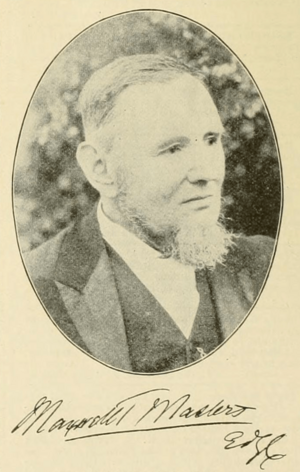Maxwell T. Masters facts for kids
Quick facts for kids
Maxwell T. Masters
|
|
|---|---|
 |
|
| Born |
Maxwell Tylden Masters
15 April 1833 |
| Died | 30 May 1907 (aged 74) Mount, Ealing, England, United Kingdom
|
| Nationality | English |
| Occupation | Botanist, taxonomist |
| Parent(s) | Wiliam Masters |
Maxwell Tylden Masters FRS (born April 15, 1833 – died May 30, 1907) was an important English botanist and taxonomist. A botanist is a scientist who studies plants. A taxonomist helps to classify and name different kinds of plants.
Maxwell was the son of William Masters. His father was also a botanist and ran a plant nursery in Canterbury.
Contents
Studying Plants
Maxwell Tylden Masters went to college at King's College London. He also studied at the University of St Andrews. While there, he learned from famous scientists like Edward Forbes and John Lindley.
His Important Works
One of Maxwell's most famous books was Vegetable Teratology. This book looked at unusual changes or mutations in plants. These are like strange growths or different shapes that plants can sometimes have.
He also wrote many works about plants from China. He focused a lot on conifers, which are trees like pines and firs. He described many new species that were found by another explorer, Ernest Henry Wilson.
Plants Named After Him
Some plants were named in Maxwell Tylden Masters' honor. For example, a type of larch tree, Larix mastersiana, carries his name. Also, a special plant called N. × mastersiana is a hybrid (a mix of two different plants) named after him. A group of plants called Maxwellia from New Caledonia was also named after him in 1871.
Working Life and Achievements
From 1866 to 1907, Maxwell Tylden Masters was the editor of a well-known magazine called the Gardeners' Chronicle. This job led him to write letters to Charles Darwin, a very famous scientist.
In 1870, he was chosen to be a fellow of the Royal Society. This is a group of top scientists in the United Kingdom.
International Recognition
Maxwell Masters also received honors from other countries. In 1888, he became a correspondent of the Institute of France. This is a group of important scholars in France. He was also given an award from Belgium, called the chevalier of the Order of Leopold.
Later Life
Maxwell Tylden Masters passed away on May 30, 1907, in Ealing, England. His body was cremated. After he died, people remembered him for helping important plant organizations. He helped make sure that Kew Gardens and the Royal Horticultural Society (RHS) could continue their important work. He also helped protect the RHS Lindley Library, which holds many valuable books about plants.
Family Life
In 1858, Maxwell Tylden Masters married Ellen Tress. They had four children together. His wife and two of their daughters were still alive when he passed away.
 | Mary Eliza Mahoney |
 | Susie King Taylor |
 | Ida Gray |
 | Eliza Ann Grier |

